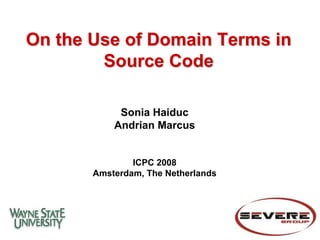Melden
Teilen
Downloaden Sie, um offline zu lesen

Empfohlen
Empfohlen
Presented at: The 44th IEEE/ACM International Conference on Software Engineering (ICSE 2022)
Date of Conference: May 2022
Conference Location: Virtual & Pittsburgh, PA, USA
This paper was originally published in the Empirical Software Engineering journal
The preprint is available at: https://arxiv.org/pdf/2110.12229
A video of the presentation is available at: https://youtu.be/suWRL2nmxMsHow Do I Refactor This? An Empirical Study on Refactoring Trends and Topics i...

How Do I Refactor This? An Empirical Study on Refactoring Trends and Topics i...University of Hawai‘i at Mānoa
Principal of programming languagecomputer-science_engineering_principles-of-programming-languages_introduction...

computer-science_engineering_principles-of-programming-languages_introduction...AshutoshSharma874829
Weitere ähnliche Inhalte
Ähnlich wie On the Use of Domain Terms in Source Code
Presented at: The 44th IEEE/ACM International Conference on Software Engineering (ICSE 2022)
Date of Conference: May 2022
Conference Location: Virtual & Pittsburgh, PA, USA
This paper was originally published in the Empirical Software Engineering journal
The preprint is available at: https://arxiv.org/pdf/2110.12229
A video of the presentation is available at: https://youtu.be/suWRL2nmxMsHow Do I Refactor This? An Empirical Study on Refactoring Trends and Topics i...

How Do I Refactor This? An Empirical Study on Refactoring Trends and Topics i...University of Hawai‘i at Mānoa
Principal of programming languagecomputer-science_engineering_principles-of-programming-languages_introduction...

computer-science_engineering_principles-of-programming-languages_introduction...AshutoshSharma874829
Ähnlich wie On the Use of Domain Terms in Source Code (20)
How Do I Refactor This? An Empirical Study on Refactoring Trends and Topics i...

How Do I Refactor This? An Empirical Study on Refactoring Trends and Topics i...
"Node.js Development in 2024: trends and tools", Nikita Galkin 

"Node.js Development in 2024: trends and tools", Nikita Galkin
130817 latifa guerrouj - context-aware source code vocabulary normalization...

130817 latifa guerrouj - context-aware source code vocabulary normalization...
Generative Software Development. Overview and Examples

Generative Software Development. Overview and Examples
Voice Enabled Desktop Interaction and Control System (VEDICS).

Voice Enabled Desktop Interaction and Control System (VEDICS).
computer-science_engineering_principles-of-programming-languages_introduction...

computer-science_engineering_principles-of-programming-languages_introduction...
The big DAM debate: Open source VS. proprietary software

The big DAM debate: Open source VS. proprietary software
On the Use of Domain Terms in Source Code
- 1. On the Use of Domain Terms in Source Code Sonia Haiduc Andrian Marcus ICPC 2008 Amsterdam, The Netherlands
- 2. Importance of Domain Terms in Program Comprehension • Requirements documents, conversation between stakeholders, etc. -> expressed using domain terms • Source code – representation of domain -> domain concepts in the source code • Using domain terms in source code - essential for reuse -> intent of the software • Concept/concern location, traceability, etc. • XP -> system metaphor -> the use of the same words to describe the same concepts is desirable
- 3. What is the Code about? void setAccount(…) void getCarPart() { { int x; int x; int y; float y; String z; String z; … … } }
- 4. Lexical Agreement • Furnas: 20% probability of two people choosing the same word to express the same concept • Summarization: 20% lexical agreement between summaries of the same document -> catastrophe for comprehending source code
- 5. Research Questions RQ1. To what degree are domain terms found in the source code of software from a particular problem domain? RQ2. Which is the preponderant source of domain terms: identifiers or comments? RQ3. To what level do programmers agree in choosing domain terms across systems from the same problem domain?
- 6. Case Study • 6 graph theory libraries (2 C++, 4 Java) • 135 domain concepts, 193 domain terms (http://www.cs.wayne.edu/~severe/icpc2008)
- 7. Lexica • Domain vocabulary • Software vocabulary • Software domain vocabulary • Filtering and stemming
- 8. RQ1. Degree of Domain Terms in Source Code • On average, 42% of the domain terms appear in the software domain vocabulary of one library • 77% of the domain terms were used in at least one of the six libraries • The size of the software domain vocabularies is correlated with the size of the software systems and software vocabularies
- 9. RQ2. Domain Terms in Identifiers and Comments • On average, 90% of the domain terms found in a software library are found in comments, whereas only 78% are found in identifiers -> comments richer source of domain terms and should not be ignored • 23% of domain terms found in a software library are found only in comments, whereas only 11% are found only in identifiers -> comments complete the domain information when missing from identifiers
- 10. RQ3. Lexical Agreement • Software libraries – partial summaries of a problem domain • Pair-wise lexical agreement measure from summarization • Agreement of 63% between pairs of libraries (compared to 24% in document summaries) • 18 domain terms used in all libraries • Up to 98% of domain terms reused between pairs of libraries
- 11. Threats to Validity • Only one domain considered • List of domain terms and concepts manually picked • Verification in source code of term meaning • Considered the software libraries as partial summaries of a domain
- 12. Future Work • More case studies, different domains • Verification of the meaning of terms in source code - consider word relationships to determine the meaning of words automatically • Analyze other software artifacts (requirement documents, user manuals, bug reports, etc.)
- 13. Conclusion • 42% of domain terms are found in the source code -> domain ontologies constructed from the source code will be far from complete • Comments are a richer source of domain terms than identifiers and contain extra domain terms -> comments should not be ignored by tools nor by programmers • High lexical agreement between programmers -> developers familiar with the domain will have an easier time understanding source code in the same domain, even when written by others. -> domain-specific tools
